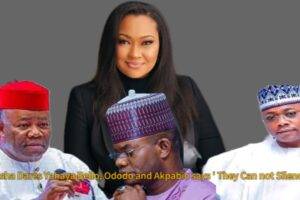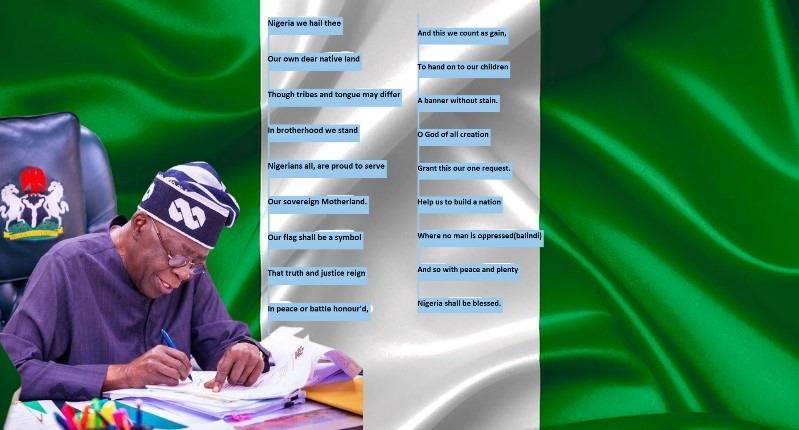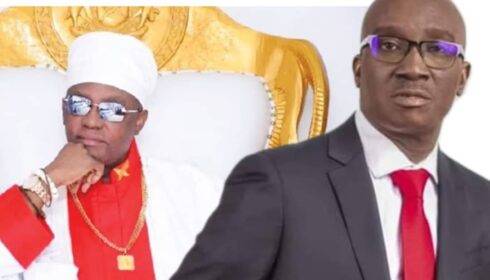In a historic move, President Bola Tinubu on Wednesday signed into law the bill to revert to Nigeria’s old national anthem, “Nigeria We Hail Thee,” which had been replaced in 1978 by the military government of Olusegun Obasanjo. The newly re-adopted anthem, written by Lillian Jean Williams in 1959 and composed by Frances Berda, begins with the lines “Nigeria, We Hail Thee.”
This decision marks a significant shift, as the previous anthem, “Arise, O Compatriots,” was introduced during a time of national turmoil following the civil war. It called on Nigerians to “serve our fatherland with love and strength” and not let “the labour of our heroes past [be] in vain.” The change has been met with mixed reactions from the public.
Divided Opinions on the Anthem Change back to ‘Nigeria We Hail Thee’
The decision to revert to the old national anthem to “Nigeria We Hail Thee” has sparked a range of opinions among Nigerians. Some have welcomed the move, seeing it as a symbol of the country’s strength in diversity and a celebration of its democratic journey. Others have expressed incredulity, questioning the government’s priorities amidst pressing economic and security challenges.
Cheta Nwanze, a lead partner at SBM Intelligence, criticized the decision, stating, “It is a waste of time. What is more important are inflation and security problems: that is what the government should squarely be looking at.” Chioma Agwuegbo, an activist and the head of TechHer, an Abuja-based nonprofit, expressed concern about the lack of public consultation, calling it “a disaster.”
Celebrating Nigeria’s Diversity and Democracy
Supporters of the anthem change have hailed it as a recognition of Nigeria’s diversity and a nod to the country’s democratic progress. The lyrics of “Nigeria, We Hail Thee” emphasize unity and brotherhood, resonating with those who see the anthem as a symbol of the nation’s strength in its diversity.
Furthermore, the decision to revert to the old anthem “Nigeria We Hail Thee,” has been viewed by some as a symbolic gesture towards preserving and strengthening Nigeria’s democratic institutions. President Tinubu, during a visit to the National Assembly, emphasized the importance of nurturing democracy for future generations, stating, “We must nurture our democracy so that our children and great grandchildren will be assured of prosperity, progress, and development.”
Controversy Over Colonial Legacy
While the decision has garnered support from some quarters, others have criticized the move, citing concerns over its colonial origins. Both Lillian Jean Williams and Frances Berda, the writers of “Nigeria, We Hail Thee,” were British citizens, leading some to argue that reverting to an anthem that lacks an indigenous Nigerian signature is a step backward for the country.
Critics have questioned the decision to embrace an imprint enforced by colonial rulers, arguing that it undermines Nigeria’s sovereignty and identity. They have called for the adoption of a truly indigenous anthem that reflects the nation’s rich cultural heritage and aspirations.
President Tinubu’s Campaign Promise Fulfilled
The reintroduction of the old national anthem “Nigeria We Hail Thee,” was a campaign promise made by President Bola Tinubu, who vowed to return Nigeria to what he deemed its heritage. The decision to retire the “Arise” anthem, introduced by the military government of Olusegun Obasanjo in 1978, has been hailed by Tinubu’s supporters as a fulfillment of his pledge to restore Nigeria’s historical roots.
However, critics have questioned the rationale behind this move, suggesting that the government should prioritize more pressing issues such as economic development, security, and infrastructural improvements over symbolic gestures.
As Nigeria navigates this pivotal moment in its history, the debate surrounding the national anthem “Nigeria We Hail Thee,” has become a microcosm of the larger discussions on national identity, cultural preservation, and the country’s aspirations for the future. Only time will tell how this decision will shape the nation’s trajectory and its impact on fostering unity and progress.
Table of Contents
Discover more from OGM News NG
Subscribe to get the latest posts sent to your email.














